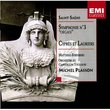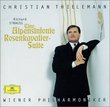| All Artists: Ludwig van Beethoven, Felix Weingartner, London Philharmonic Orchestra, Royal Philharmonic Orchestra Title: Beethoven: Symphony No. 5; Sonata No. 29 "Hammerklavier" (orch. Weingartner) Members Wishing: 0 Total Copies: 0 Label: Naxos Release Date: 8/17/2004 Genre: Classical Styles: Ballets & Dances, Ballets, Forms & Genres, Sonatas, Historical Periods, Classical (c.1770-1830), Modern, 20th, & 21st Century, Romantic (c.1820-1910), Symphonies Number of Discs: 1 SwapaCD Credits: 1 UPC: 636943191323 |
Search - Ludwig van Beethoven, Felix Weingartner, London Philharmonic Orchestra :: Beethoven: Symphony No. 5; Sonata No. 29 "Hammerklavier" (orch. Weingartner)
 | Ludwig van Beethoven, Felix Weingartner, London Philharmonic Orchestra Beethoven: Symphony No. 5; Sonata No. 29 "Hammerklavier" (orch. Weingartner) Genre: Classical |
Larger Image |
CD DetailsSimilarly Requested CDs
|
CD ReviewsCurious you must be... J. F. Laurson | Washington, DC United States | 01/08/2005 (3 out of 5 stars) "You may have heard Liszt's transcriptions of Beethoven symphonies. They are fine works and an interesting way to listen to all-too-familiar masterpieces. Their reason for existance was the spread of Beethoven's music when symphonic concerts were rare and out of the reach for most people - not to mention the unavailability of sound recordings. In this role-reversal, Weingartner took the Hammerklavier sonata and orchestrated it during a time where recordings were still nascent and piano recitals few and far between. Though certainly symphonic in length, op.106 does not seem to be particularly suited to such treatment and the very notion defies all our sensibilities of Werktreue. Still, it's a curious and curious-making monument of Weingartner's admiration of Beethoven. I am not sure if it reveals much new about the work and I am certain that it sounds better on the piano. Charles Rosen thought it "silly". The 1930's sound, remastered by Mark Obert-Thorn, is restricted and full of hiss (though listenable). The Prometheus Overture and 5th Symphony (1933) feature the LPO in a bad accoustic and are not even Weingartner's best recordings thereof. Still, it's "interesting" in the more flattering meaning of the word for hearing the "Hammerklavier" strung up... at least for the very, very curious of us. " Merely OK Fifth, Messy 'Hammerklavier' J Scott Morrison | Middlebury VT, USA | 08/24/2004 (3 out of 5 stars) "I've been raving about Naxos's (and Mark Obert-Thorn's) transfers of Felix Weingartner's Beethoven recordings and with this issue we come to the end of the series. It includes his 1933 Beethoven Fifth Symphony which is, frankly, not among its great recordings. It has some drama, nuanced phrasing, competent playing by the London Philharmonic, and some of Weingartner's expected finesse. But when compared with Weingartner's great recording of the Fifth from 1932 with the sadly short-lived British Symphony Orchestra (see my review of that release) it simply falls short. When coupled with a very nearly unlistenable recording of Weingartner's own orchestration of the 'Hammerklavier' Piano Sonata this CD becomes the only weak link in this otherwise commendable series. There is a marvelous recording, from 1933, of Beethoven's 'Creatures of Prometheus' Overture, but those five minutes are not enough to make this CD a must except for Weingartner completists. Now a further word about the orchestration of the 'Hammerklavier.' The orchestra here, the Royal Philharmonic, is guilty of sloppy playing and some execrable tuning. Further, the recording itself is in shrill and constricted sound with distortion, clipping and pitch instability that wizard Obert-Thorn was unable to improve very much. Then there's the orchestration itself. If ever there was a piano piece that requires the tactility of the piano, it's the 'Hammerklavier.' Just listen to that first left-hand leap in the bass; it is extraordinarily difficult to pull off for a pianist, but the orchestra can, of course, do it easily. Surely Beethoven wanted the listener to react to the physical strain of that left-hand maneuver, don't you think? Finally, there are so many places where piano figuration simply doesn't translate well into instrumental sound. A perfect example would be the filigree in some of the variations in the Adagio movement. They sound, to quote Charles Rosen, 'silly' in the orchestra, where they are beautiful on the piano. The fourth movement fugue is smeared by the RPO and even if it were played beautifully it would still sound 'silly.' My advice: unless you are Weingartner completist, avoid this issue. It is fine as a historical document, but not as a musical experience. Scott Morrison" Not the best of Weingartner Ralph J. Steinberg | New York, NY United States | 08/19/2005 (2 out of 5 stars) "This issue is valuable only as a curiosity. The "Hammerklavier" transcription shows how past generations misunderstood the true nature of this sonata and the necessity of a keyboard to convey its sense of struggle; an orchestral arrangement merely smoothes things over. The 1933 Fifth Symphony, usually included in the issues of the Weingartner Nine, is a pallid shadow of the volatile British Symphony recording of a year earlier. This is the only set of Weingartner which I do not find of interest, much less of enjoyment or illumination."
|










